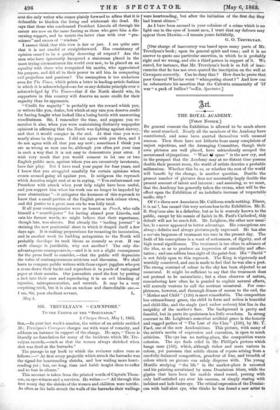MR. TREVELYAN'S " CAWNPORE."
To THE EDITOR OF THE "SPECTATOR."
2 Clarges Street, May 1, 1865.
yourdast week's number, the writer of an article entitled Mr. Trevelyan's Cawnpore charges me with want of veracity, and adduces an instance in support of the charge. He says, "There is literally no foundation for many of the incidents which Mr. Tre- velyan records,—such as that the women always shrieked when shot was fired at the barracks."
The passage in my book to which the reviewer refers runs as follows :—" At first every projectile which struck the barracks was the signal for heartrending shrieks, and low wailing more heart- rending yet ; but, ere long, time and habit taught them to suffer and to fear in silence."
This account is taken from the printed words of Captain Thom- son, an eye-witness and a survivor. He writes :—" All through this first weary day the shrieks of the women and children were terrific. As often as the balls struck the walls of the barracks their wailings were heartrending, but after the initiation of the first day they had learnt silence."
As I have been accused in your columns of a crime which is no light one in the eyes of honest men, I trust that my defence may appear there likewise.—I remain yours faithfully,
G. 0. TREVELYAN.
[Our charge of inaccuracy was based upon many parts of Mr. Trevelyan's book; upon its general spirit and tone; and it is no answer to quote one particular assertion, in which he is probably right and we wrong, and cite a third person in support of it. We stated, for instance, that Mr. l'revelyan's book is so full of inac- curacies that he has not even quoted the inscription on the well at Cawnpore correctly. Can he deny that? How does he prove that poor General Wheeler went whimpering about ? " And how can- he substantiate his assertion that the Calcutta community of '57 was "a pack of bullies? "—En. Spectator.]






























 Previous page
Previous page